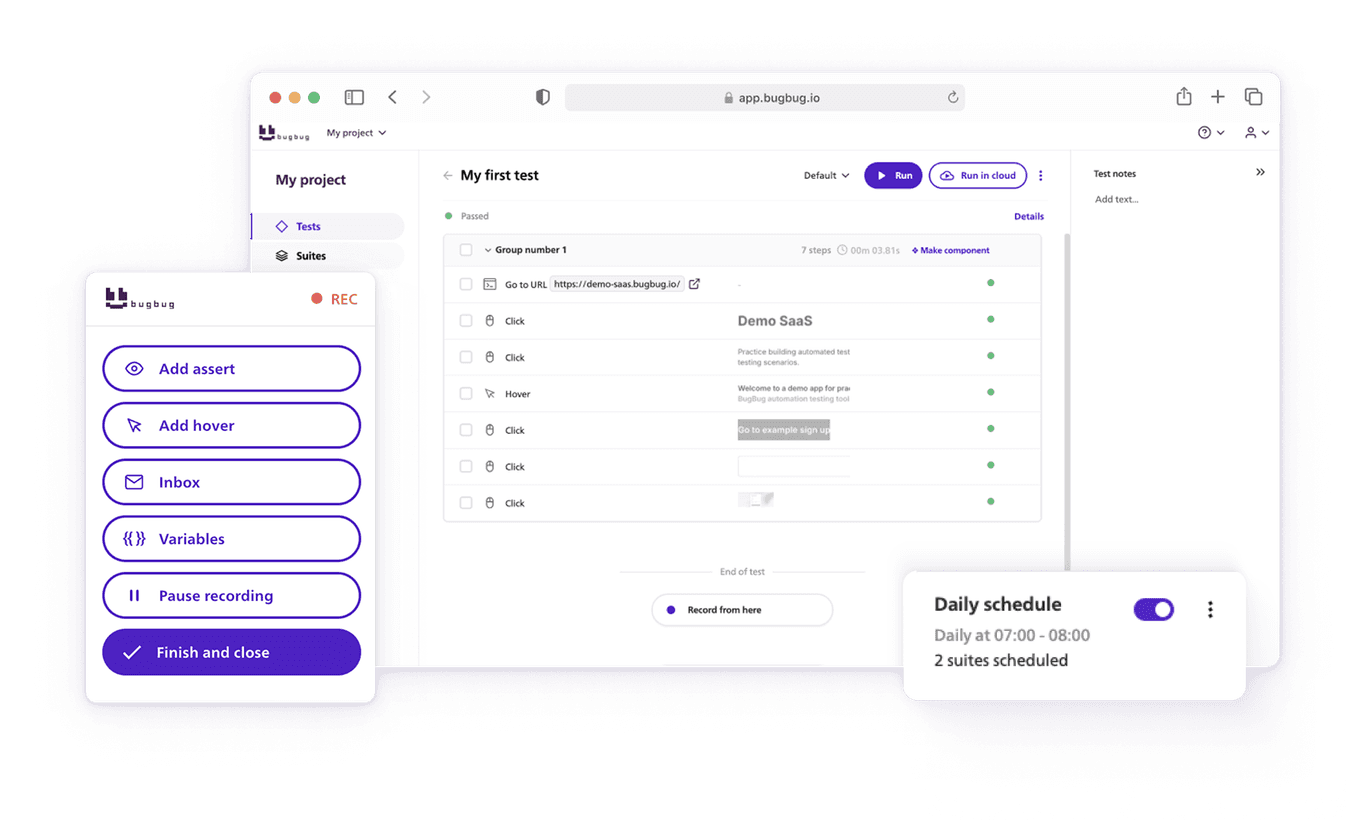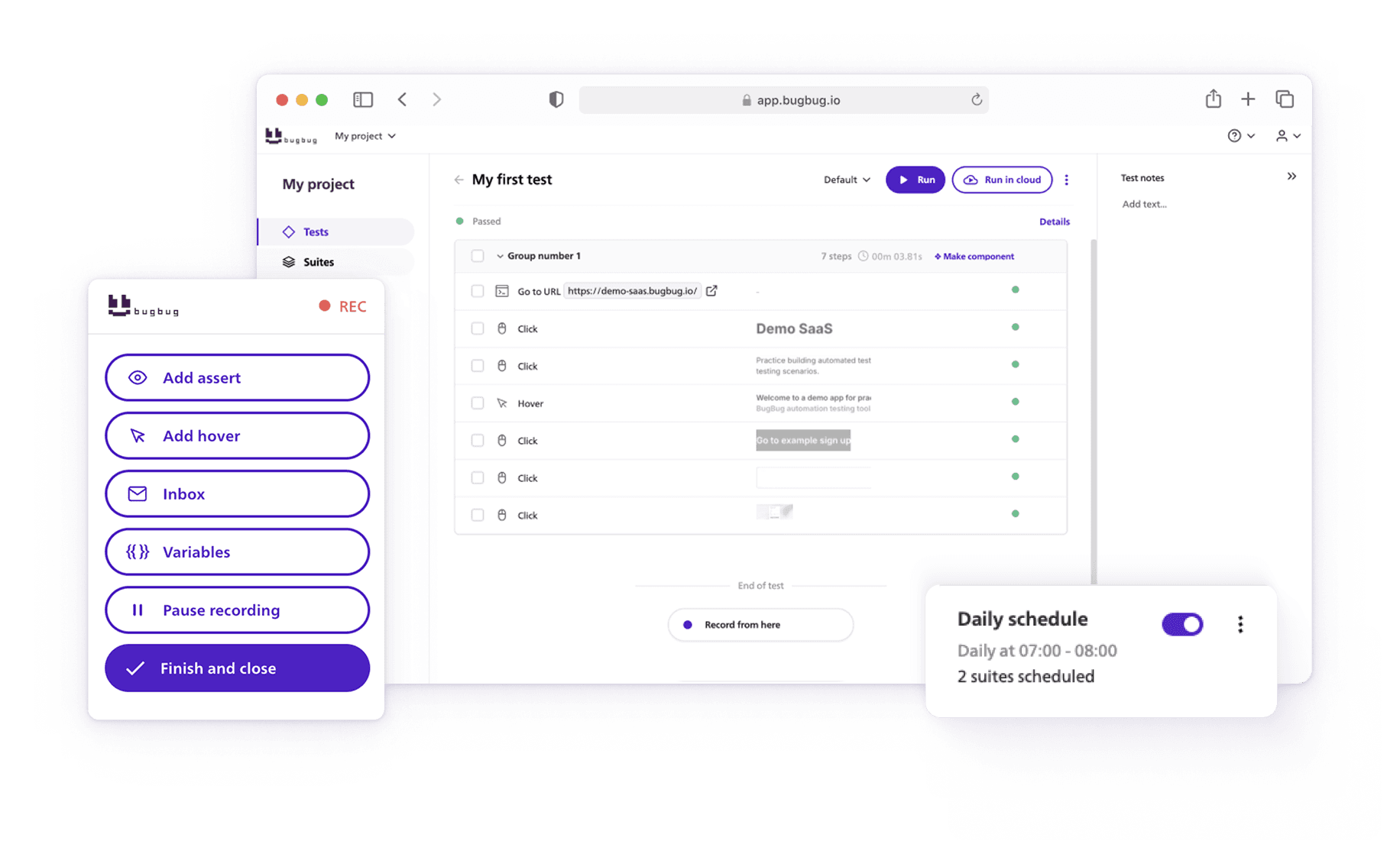When you're building a web app or a mobile app, testing is an essential part of the software development cycle. Sooner or later, you'll start thinking about how to automate the testing process so you don't have to spend hours clicking through your user interface. When that moment comes, it's a smart move to choose the right toolset for automated testing.
Below we've listed the best tools for QA automation, grouped by their suitability for different types of companies and technologies.
Best tools at a glance
Top 3 test automation tools for startups
- The easiest test automation for web: BugBug
- The fastest way to test mobile apps: Sofy.ai
- Best for coding end-to-end tests: Cypress
Top 3 tools for enterprise QA automation
- Most mature for testing desktop applications: TestComplete
- Best for advanced testing workflow: Katalon
- Most popular for testing everything: Selenium & Appium
How to choose a test automation tool?
Before you choose a test automation tool, you should ask yourself a few questions that will help you understand what type of tool is right for you. Different tools may be suitable for startups (e.g. BugBug) and quite different for complex enterprise software (e.g. TestComplete).
1. At what stage of development is your software?
Are you still a startup? Is your product developing fast? Or maybe you are already a large organization with a dedicated QA team, corporate customers and extensive release process?
2. What technologies do you want to test?
Do you have a web or mobile application? Or maybe both? If your product is based on only one technology, perhaps you don't need a cross-platform tool.
3. What is your budget for QA?
How much do you want to spend on test automation to make it profitable for you? Can you afford to hire a full-time QA engineer, or will you be doing it yourself?
4. How will the success of automated testing be measured?
Do you want to monitor a key metric like "test coverage", or do you care about detecting bugs that actually affect users?
5. Do you want to code end-to-end tests?
Do you want to maintain those in a git repository? Will developers be writing end-to-end tests? Will testing be part of the build process?
Your choice of tool should be based on your business goal: If you're building a skyscraper, you'll need a crane, but if you're building a tree house, a ladder might suffice. If you choose the wrong tool, you might just waste time instead of getting value from automated testing.
Top 3 test automation tools for startups
Best for simple test automation of web apps: BugBug
If you're looking for a simple solution and don't want to hire new people, BugBug is the right choice. The tool is easy to learn and is based on a Chrome extension that allows you to quickly "record and play" your tests.
Simply click on your website to record the test steps instructions. When you click "run test", BugBug performs the same steps and checks if everything works as it should.

Pros:
- Easy to use, no coding required
- Clean interface
- Fast and stable tests
- Fully functional free version
- Unlimited local and cloud testing
Cons:
- Only for web apps, does not support mobile apps
- Based on Chrome Extension, so only works in Chromium-based browsers (Chrome, Edge, Opera)
Good choice for:
- Startups based on web technologies
- E-commerce platforms
- Freelance web developers (Wordpress, Strapi, Webflow)
- Web agencies
Automate your tests for free
Test easier than ever with BugBug test recorder. Faster than coding. Free forever.
Get started
The fastest way to test mobile apps: Sofy.ai
If you are developing a mobile app, automation development can be challenging because you need to code for two platforms: Android and iOS. Sofy.ai comes to the rescue - this tool lets you create automated tests without coding.
You upload your app and use a web browser to control real mobile devices. Sofy.ai can record your manual tests and play them back automatically.

Pros:
- No-code
- Real mobile devices
- Not too complicated
Cons:
- The first time you use it, you might get a little lost
- Connection to devices based on screensharing is quite slow
- Hard to find the pricing
Good choice for:
- Startups that rely on mobile apps
Best for end-to-end testing in code: Cypress
Not a fan of no-code tools? Why not choose Cypress - one of the most popular test automation frameworks lately. Cypress is built with JavaScript developers in mind and has become the industry standard of modern tech stack over the past few years.
As it happens with coding, you can achieve anything you want, but nothing is straightforward. Once you get through the rough first steps and figure out your rookie mistakes, you are completely empowered to automate testing any kind of website.

Pros:
- Open-source
- Widely used and has a developed community
- Massive amount of functionality and integration possibilities
Cons:
- You need to know JavaScript well
- No multi-tab support
- No native mobile apps support (only webview)
- Running tests in the cloud is more expensive than alternatives (Cypress charges $75/month)
Good choice for:
- Startups that are strong in JavaScript
- Bigger agile teams with a dedicated QA engineer
Automate your tests for free
Test easier than ever with BugBug test recorder. Faster than coding. Free forever.
Get started
Top 3 tools for QA automation of complex cross-platform applications
The most mature solution for testing desktop applications: TestComplete
TestComplete is a fairly sophisticated tool, that has been developed since years and proven in battle by many corporations. You can use it to test basically everything, desktop testing (Windows, Java, .NET), web testing (React, Angular, Vue, etc.) and mobile testing (Android, iOS) are supported.
It's a multi-functional sophisticated tool with a million useful features, so just reading the documentation will take you days.

Pros:
- Huge amount of features needed for collaboration in largescale organizations
- OCR (Optical Character Recognition)
- Enterprise-grade customer support and professional services
Cons:
- High pricepoint (you need anywhere from $2000 to $6000)
- Complicated, requires training
- Interface based on native Windows components may seem outdated (although for some this is an advantage)
Best for advanced testing: Katalon
Katalon is a tool dedicated to enterprise segment based on a desktop application. It has everything that large business need: tools for full visibility, enhanced security, custom server configuration, and integrations.
Katalon differs from other tools in that it is more low-code than no-code - you can create tests using the "record and replay" method or you can write automated test scripts yourself.

Pros:
- Versatility - you can test any platform
- Extensive security options
- Collaboration, reporting, integrations
- Ability to write tests in code
Cons:
- High price for premium features (reserve from $2000 to $4000 per year, but luckily there is also a free option)
- Requires coaching and training of employees
- To take full advantage of test automation you need to integrate other tools
The classic duo for testing everything: Selenium & Appium
Selenium framework is a classic in the end-to-end testing scene. Every self-respecting QA engineer should be familiar with Selenium Webdriver and know its limitations and shortcomings for regression testing. Its biggest advantage is its widespread popularity and free availability.
You can either write tests in code or use a browser plugin (Selenium IDE) that allows you to record test steps with a click, but be aware that throughout the process you will often have to swear out loud during the process. To test native mobile apps you need to combine Selenium with Appium, which uses the same Webdriver API but runs on mobile devices.

Pros:
- Popularity
- Versatility
- Free & open-source
Cons:
- No interface - it's a coding framework
- Poor UX and UI of Selenium IDE, it feels more like a proof of concept than a real tool
- No built-in cloud testing, it requires integration with third-party services
- No collaboration tools or ways to enforce testing principles - this can lead to clutter and bugs
Automate your tests for free
Test easier than ever with BugBug test recorder. Faster than coding. Free forever.
Get started
The market for testing tools is huge, and there is no single leader. Currently, you have a choice of more than 30 different tools, all of which have different advantages and disadvantages. If the above list is not enough for you, you can browse all the options on a specialized website that collects numerous alternatives.
The most important thing is that you choose wisely!
Happy (automated) testing!



